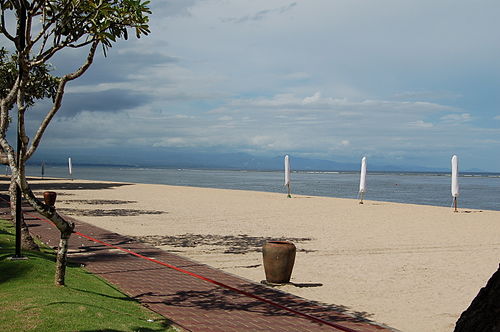This articleneeds additional citations forverification. Please helpimprove this article byadding citations to reliable sources. Unsourced material may be challenged and removed. Find sources: "Nyepi" – news ·newspapers ·books ·scholar ·JSTOR(April 2025) (Learn how and when to remove this message) |
| Nyepi | |
|---|---|
 A deserted Balinese beach during Nyepi | |
| Also called | Day of Silence |
| Observed by | Balinese Hinduism |
| Type | Hindus, cultural |
| Celebrations | Performtapa brata penyepian |
| Observances |
|
| Begins | 06:00 |
| Ends | 06:00 the next day |
| Date | HinduBalinese Saka 1 Kedasa |
| 2025 date | 29 March |
Nyepi, also known asDay of Silence, is aBalinese holiday held everyIsakawarsa ("new year") according to theBalinese calendar, and it can be traced as far back as 78 A.D.[1]
The observance includes maintaining silence,fasting, and meditation forBalinese Hindus. The following day is celebrated as New Year's Day.[2][3] After Nyepi, youths in the village of Sesetan in southern Bali practice the ceremony ofomed-omedan, or "kissing ritual".[4]
 | This sectionpossibly containsoriginal research. Pleaseimprove it byverifying the claims made and addinginline citations. Statements consisting only of original research should be removed.(March 2025) (Learn how and when to remove this message) |
Observed from 6 a.m. until 6 a.m. the next morning, Nyepi is a day reserved forself-reflection, and anything that might interfere with that purpose is restricted.[citation needed] The main restrictions are on lighting fires (and lights must be kept low); no working; no entertainment or pleasure; no traveling; and, for some, no talking or eating at all.[citation needed]
The effect of these prohibitions is that Bali's usually bustling streets and roads become empty, there is little or no noise from TVs and radios, and few signs of activity are visible inside homes. The only people to be seen outdoors are thepecalang, traditional security men who patrol the streets to ensure the prohibitions are being followed.[citation needed]
Although Nyepi is primarily a Hindu holiday, non-Hindu residents and tourists are not exempt from the restrictions. Although they are free to do as they wish inside hotels, no one is allowed onto beaches or streets, and theonly airport in Bali remains closed for the entire day. Tourists who violate these rules can face deportation.[5]
On the afternoon and evening before Nyepi, accessibility on roads is limited. Many local roads are closed for evening parades, making it difficult to navigate by car or motorcycle. Most local restaurants close early, and many ATMs are switched off, with cash removed until the day following Nyepi.[6] Electricity remains operational, however.[citation needed]
The only exceptions granted are foremergency vehicles responding to life-threatening conditions and women going into labor.[7][8]
On the day after Nyepi, known asNgembak Geni ("relighting the fire"), social activity picks up again, as families and friends gather to ask forgiveness from one another and to perform religious rituals together. Fires and electricity are allowed once more, and cooking resumes.[citation needed]


Most Balinese villages makeogoh-ogoh, demonic statues made of richly painted bamboo,papier-mâché, cloth, andtinsel, symbolising negative elements, malevolent spirits, or even characters from Hindu mythology. After theogoh-ogoh have been paraded around the village, they are burned in the cemeteries, although many are displayed in front of community halls for another month or more and sometimes even purchased by museums and collectors.[citation needed]

| CE year | Balinese year | Nyepi date |
|---|---|---|
| 2024 | 1946 | 11 March |
| 2025 | 1947 | 29 March |
| 2026 | 1948 | 19 March |
In 2024, theogoh-ogoh parades were cancelled due to thegeneral election being so close to the date of the festival and the regional government fearing that the parade may be used to convey political themes. Only villages, in particular traditional ones, were allowed to hold parades.[17]
Nyepi is related to festivals observed by Hindus in theIndian subcontinent, although the dates are not the same, due to the use of different calendars. For example, the Hindus ofMaharashtra term their new yearGudi Padwa (inMarathi: गुढी पाडवा);Sindhis celebrate the beginning of their calendar year asCheti Chand;Manipuris celebrateSajibu Nongma Panba; and Hindus ofAndhra Pradesh andKarnataka celebrateUgadi.
Security is provided byhansip, while thepecalang are redirected into security roles from their usual tasks such as traffic coordination; both types of security forces report to local village heads.[18]